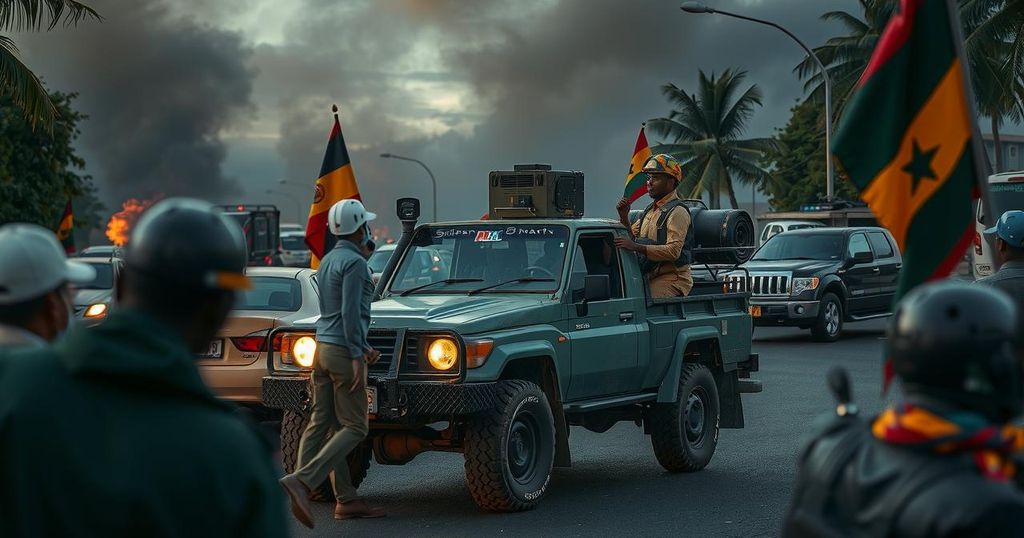Mozambique Protests Escalate After Election Controversy, Military Incident Occurs
In Mozambique, protests erupt following claims of a rigged election, leading to a military vehicle striking a woman in Maputo and police violence resulting in deaths. Critics accuse the ruling Frelimo party of electoral fraud, sparking widespread unrest as citizens demand accountability and reform. Despite the risks, demonstrators continue to rally for change, reflecting deep-seated frustrations with the government’s practices.
A tragic incident unfolded in the Mozambican capital, Maputo, when a military vehicle struck a woman amidst ongoing protests sparked by claims of electoral fraud following the recent October elections. Footage circulating on social media depicts the armored vehicle barreling through a makeshift barricade adorned with an image of opposition leader Venâncio Mondlane, subsequently running over the woman, who fortunately sustained non-life-threatening head injuries. The Mozambican armed forces have characterized the incident as an unfortunate accident, expressing their intention to provide for her medical needs and pledging a thorough investigation to prevent future occurrences.
In parallel, unrest grew in Nampula where police reportedly shot dead two protesters during clashes, illustrating the heightened tensions that have emerged since the elections. Official results declared that Daniel Chapo of the ruling Frelimo party secured 70.7% of the vote, while Mondlane received 20.3%, leading many citizens, including young and informed voters, to denounce the electoral process as rigged. Mondlane, currently in exile, has galvanized support for protests, urging citizens to disrupt daily activities, a call that has resonated across the nation.
Protesters gathered in various locales, including along the highway to South Africa’s border, participating in demonstrations infused with both anger and rhythm, partaking in communal meals while chanting slogans against the ruling party. Reports from human rights organizations highlight the tragic loss of life, noting that at least ten children have been killed by security forces since the escalation of protests. The Centers for Democracy and Human Rights report indicates that 65 individuals have died due to police violence, reflecting the dire atmosphere of dissent and unrest.
Activists have condemned the rising violence against civilians, echoing sentiments expressed by the US, UK, and other embassies which issued a joint statement denouncing the egregious acts of brutality during these protests. The deaths of individuals, such as lawyer Elvino Dias and filmmaker Paulo Guambe, due to targeted attacks further underscore the climate of danger faced by opposition figures. Citizens demand change and justice, boldly asserting their readiness to resist oppression despite threats of violence, a sentiment illustrated by one protestor’s declaration of willingness to sacrifice for the cause of freedom.
The recent protests in Mozambique were triggered by allegations of electoral fraud following the presidential election held on October 9, 2023. The ruling Frelimo party, in power since 1975, claims significant support, while opposition figures such as Venâncio Mondlane contest the election results and call for civil unrest. With reports of violence against protestors increasing, Mozambicans, especially young voters, express a collective desire for political change and demand accountability from the government for past and ongoing abuses. This unrest reflects broader grievances over corruption and oppression felt by many citizens in the southern African nation.
The unfolding situation in Mozambique illustrates the deeply rooted frustrations of the populace against perceived governmental injustices and electoral malpractice. The tragic incident involving the military vehicle serves as a stark reminder of the risks faced by citizens engaged in protest, as well as the urgent need for accountability and justice in the wake of escalating violence. As protests persist and calls for democracy are voiced, international attention to the plight of Mozambicans may become increasingly essential in advocating for reform and the protection of human rights within the nation.
Original Source: www.theguardian.com




Post Comment